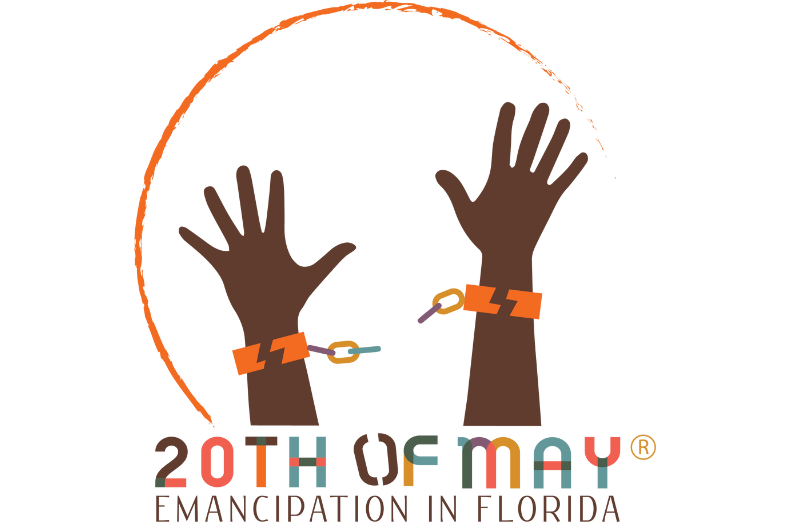
Emancipation in Florida
May 20, 1865
MAY 20, 1865 Florida’s Emancipation
Be A Part of the Annual Celebration
More than two years after the Emancipation Proclamation is issued, word reaches Florida’s Capital City on May 20, 1865, nearly a full month before finally reaching Texas on June 19 (Juneteenth).

Emancipation Day in Florida, to be historically correct, should be acknowledged and celebrated on May 20th.
Today, news of a single event can be transmitted across the planet in seconds. This was not the case in April 1865, as the Civil War was coming to an end. In the war-torn South, news traveled slowly, often by word of mouth, and the details sometimes were incorrect or contradictory. Also, noted by Clifton Lewis, Historian of the Florida African American Heritage Preservation Network, is the fact that due to the refusal of slave holders to acknowledge Abraham Lincoln as their President, slaves were not released upon the signing of the Proclamation on January 1, 1863. Neither the end of the war nor the end of slavery was absolutely confirmed until Union troops arrived in each locality to receive the surrender of their Confederate counterparts. This process happened in stages, with areas farther west learning the news weeks after the folks closer to the east coast.
Union Brigadier General Edward M. McCook arrived in Tallahassee to receive the surrender of Florida’s Confederate troops on May 10th. On May 20th, McCook formally announced President Lincoln’s Emancipation Proclamation from the steps of the Knott House, effectively ending slavery in the state. As a result, many Floridians celebrate May 20th as Emancipation Day.
A month later, on June 18th, Union General Gordon Granger landed at Galveston with 2,000 soldiers to occupy Texas. The following day, June 19th, he announced the Emancipation Proclamation from the balcony of the Ashton Villa. Consequently, emancipation is generally celebrated in Texas on June 19th.
Over the next months, the Union Army gradually established control of the Confederacy in States in rebellion, thus, the precise day of emancipation varied from one state to another. Florida was one of these states. Former slaves all over the south were quick to institute an annual celebration of their freedom. Today, Tallahassee and some other cities in the state continue to honor this tradition in recognition of Emancipation in Florida.
A TIMELINE OF EMANCIPATION
SEPTEMBER 22, 1862 President Abraham Lincoln issues the Preliminary Emancipation Proclamation.
DECEMBER 31, 1862 “Watch Night” – Slaves waited in churches for the dawning of the promised Emancipation on January 1, 1863.
JANUARY 1, 1863 Emancipation Proclamation becomes effective. 1864 Union Armies occupy Florida and other states in rebellion of the Emancipation Proclamation and still holding slaves, including Florida. Union Generals began to read the Proclamation as an enforcement order to slave holders; and to slaves in these states.
MAY 10, 1865 Brigadier General Edward McCook and the Union Army arrive in Leon County to receive the surrender of Florida’s Confederate troops.
MAY 20, 1865 Union General McCook reads the Emancipation Proclamation from the steps of the Knott House in Tallahassee. Slaves in Florida are freed! A celebration of freedom is held at Bull Pond now called Lake Ella, in Tallahassee.

JUNE 18-19, 1865 Union General Gordan Granger and Union Army are in Texas; the Emancipation Proclamation is read – Galveston, Texas. Slaves in Texas are freed, completing the emancipation in all slave states.
DECEMBER 6, 1865 The 13th Amendment to the US Constitution is ratified officially ending slavery in America.
MAY 20, 1866 Celebrations in Tallahassee and some other parts of the state are held annually thereafter.
MAY 20, 1997 Emancipation Day, May 20th, as an annual statewide celebration is inaugurated in Tallahassee sponsored by the Florida Department of State, Museum of Florida History and the John G. Riley Museum.

MORE RESOURCES AVAILABLE AT RileyMuseum.org
A SPECIAL THANKS TO
Florida African American Heritage Preservation Network
John W. Franklin, son of John Hope Franklin
Althemese Barnes, Director Emeritus, John Gilmore Riley Center/Museum
Tallahassee Historical Society
The Council on Culture & Arts
Tallahassee City Commissioner Dianne Williams-Cox
PHOTO CREDITS
John Gilmore Riley Center/Museum
Florida Department of State – Florida Memory
Spady Museum-Delray Beach, Florida
HISTORIANS
Mary Cathrin May
Clifton Lewis, Executive Director, L.B. Brown House Museum, Bartow, Florida



